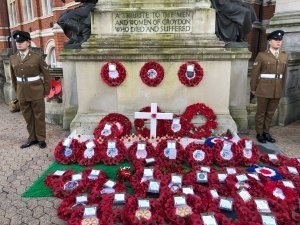The following article is courtesy of InsideCroydon.com and has been reprinted with permission.
William Dowden was one of many residents from Croydon, England, in the early 20th century who didn’t live to see his future in his native country.
Like many, he was excited to move to a country in the Empire and take up new opportunities there. He decided on Canada and ended up farming in Saskatchewan.
But those hopes of a new life changed in August 1914 with the start of the Great War. Rallying to help his old country, the following April, Dowden joined up. We do not know the year he immigrated to Canada, but we know he had some military training and experience while still in Croydon.
His attestation papers stated that he spent five years in the 4th Queen’s Territorials, based in Surrey. The book Croydon in the Great War states that William’s parents, Felix and Sarah Dowden, lived at 93 Waddon Road, and that William attended the Parish Church School. After leaving school, he began working for a gas and hot water fitter.
The Friendly City
Dowden enlisted in the magnificently named Saskatchewan town of Moose Jaw. He was one of thousands who arrived in the area seeking a new life at the beginning of the 20th century. The population increased from 1,600 in 1901 to 17,000 by 1917. In his papers, Dowden gave his occupation as a farmer. Travelling into Moose Jaw to sign up changed his life.
He was sent to a training camp for the Canadian Overseas Expeditionary Force with the 46th Battalion. On his pay chart, it states he was part of the Moose Jaw quota and was paid $15 a month from April 1915 until Oct. 22, when the unit sailed for Europe. On arrival, the Canadians travelled to Dibgate Camp, Shorncliffe, in Kent, England.
The first months of training passed uneventfully for Dowden, but life became messy after Christmas 1915. Maybe it was the impending transfer to the Western Front that was on his mind. On Jan. 3, 1916, he was punished for being absent without leave for seven days. He forfeited eight days’ pay. Where did he go? Did he go to Croydon to see his family?
Sanctioned for drunkenness
Then on Jan. 15, Dowden was found drunk on parade. He was put into detention for 24 hours and fined $2. Four days later, on Jan. 19, Dowden and his unit sailed for France. Once at the Canadian Base Camp, he and his unit were transferred to the 28th Battalion. He and his unit eventually arrived at the front on Feb. 4.
On March 31, Dowden was given 14 days’ field punishment for being AWOL from 6 p.m. March 27 until 8:30 p.m. March 27 — a whole two-and-a-half hours. He was also charged with drunkenness.
The maximum number of days a commanding officer could give as a punishment was 28. Dowden would have been shackled both by leg and arm but would still have been able to move around. The more serious Field Punishment No. 1 involved being tethered to one spot.
Nothing more appears on Dowden’s service record until his death.
He died of his wounds at the 44th Casualty Clearing Station (CCS) on Sept. 17, 1916. He was 31. This was in the area of the Somme. At that time, the 44th CCS was situated at Puchevillers, France.
A grim fight
Captain Rev. Leonard Pearson was a chaplain at the 44th. He painted a grim picture of what things were like at that time.
“I spent most of my time giving anaesthestics. I had no right to be doing this, of course, but we were simply so rushed,” he said. “We couldn’t get the wounded into the hospital quickly enough, and the journey from the battlefield was terrible for those poor lads.
“If they had to wait their turn in the normal way until the surgeon was able to perform an operation with another doctor giving the anaesthetic, it would have been too late for many of them. As it was, many died. We all simply had to help and do anything that was needed,” he continued.
“I did a lot of stretcher-help. I also helped to strip men of their filthy uniforms. We had to cut them off with scissors, and there were some nights that we cut and cut until our fingers were simply raw. We had over a thousand beds, and half the time, it wasn’t enough.”
First use of tanks
What a picture he paints of where Dowden died. The Croydon man is buried in the cemetery at Puchevillers. He is simply recorded as Private W. Dowden 426957, 28th Battalion Canadian Inf (Saskatchewan Regiment) 17th Sept 1916.
He suffered his wounds as the Canadians fought in the Battle of Flers-Courcelette, which began on Sept. 15. They attacked the village of Courcelette with the aid of three tanks, the first time the machines had ever been used on the battlefield.
We will never know the pressures Dowden felt that caused him to behave as he did in the days and weeks before and after he arrived on the Western Front. He wasn’t the only one. Iron discipline was the response from the army to anyone who didn’t toe the line.
The boy from Croydon saw a future in the West, but it was snatched from him in the mud of the Somme. He died for other people’s futures. His name is written on the Parish Roll of Honour inside Croydon Minster.




